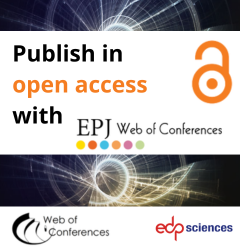Conférences > Physique > Physique numérique
Sélecionner un pays
Allemagne (7) - Belgique (1) - Chine (1) - Corée du Sud (1) - Espagne (1) - France (1) - Grèce (1) - Italie (2) - Pologne (1) - Royaume-Uni (2) - République tchèque (1) - États-Unis (3)
TOUS LES PAYS (22)
1
Dagstuhl-Seminar — Discrete Algorithms on Modern and Emerging Compute Infrastructure
12 mai 2024 - 17 mai 2024 • Schloss Dagstuhl, Wadern, Allemagne
Identifiant de l'évènement:
1566053
Page web:
2
Course — Large Eddy Simulation and Related Techniques
13 mai 2024 - 17 mai 2024 • Sint-Genesius-Rode (near Brussels) - hybrid, Belgique
Identifiant de l'évènement:
1572756
3
ADIW03 — Climate Applications of Layering
20 mai 2024 - 24 mai 2024 • Cambridge , Royaume-Uni
Identifiant de l'évènement:
1546478
Page web:
4
CEFC 2024 — 21st Biennial Conference on Electromagnetic Field Computation
02 jui 2024 - 05 jui 2024 • Jeju, Corée du Sud
Identifiant de l'évènement:
1593074
Page web:
5
Knowledge Exchange Workshop on Geometric Rigidity, Graphic Statics and Engineering
03 jui 2024 - 05 jui 2024 • ICMS@ London, Royaume-Uni
Identifiant de l'évènement:
1593144
6
Waves 2024 — 16th International Conference on Mathematical and Numerical Aspects of Wave Propagation
30 jui 2024 - 05 jul 2024 • Berlin , Allemagne
Identifiant de l'évènement:
1577258
Page web:
7
ICMP 2024 — International congress on mathematical physics
01 jul 2024 - 06 jul 2024 • Strasburg , France
Identifiant de l'évènement:
1577257
Page web:
8
CCP-2024 — 35th IUPAP Conference on Computational Physics
07 jul 2024 - 12 jul 2024 • Thesaloniki, Grèce
Identifiant de l'évènement:
1605862
Page web:
9
CECAM flagship workshop: Machine Learning of First Principles Observables
08 jul 2024 - 12 jul 2024 • Berlin, Allemagne
Identifiant de l'évènement:
1612092
10
Solving the Boltzmann Equation for Neutrino Transport in Relativistic Astrophysics
08 jul 2024 - 12 jul 2024 • Providence, RI, États-Unis
Identifiant de l'évènement:
1609258
11
Simulating Extreme Spacetimes with SpEC and SpECTRE
05 aou 2024 - 09 aou 2024 • Providence, RI, États-Unis
Identifiant de l'évènement:
1609223
12
Towards Routine Orbital-free Large-Scale Quantum-Mechanical Modelling of Materials
08 sep 2024 - 13 sep 2024 • Hangzhou, Chine
Identifiant de l'évènement:
1576792
13
correl24 — Autumn School on Correlated Electrons: Correlations and Phase Transitions
16 sep 2024 - 20 sep 2024 • Jülich, Allemagne
Identifiant de l'évènement:
1616037
Page web:
14
MMM-11 — Multiscale Materials Modeling
22 sep 2024 - 27 sep 2024 • Prague, République tchèque
Date limite de soumission des résumés:
15 mar 2024
Identifiant de l'évènement:
1583798
Page web:
15
Fourth MODE Workshop — Machine-learning Optimized Design of Experiments
23 sep 2024 - 25 sep 2024 • Valencia, Espagne
Identifiant de l'évènement:
1614195
Page web:
16
CHEP 2024 — Conference on Computing in High Energy and Nuclear Physics
19 oct 2024 - 25 oct 2024 • Cracovie, Pologne
Identifiant de l'évènement:
1614091
Page web:
17
Joint ICTP-IAEA Workshop on Monte Carlo Radiation Transport and Associated Data Needs for Medical Applications
28 oct 2024 - 08 nov 2024 • ICTP, Trieste, Italie
Identifiant de l'évènement:
1580707
Page web:
18
ZEMAX® Grundlagenseminar
06 nov 2024 - 08 nov 2024 • Berlin, Allemagne
Identifiant de l'évènement:
1602518
19
ZEMAX® OpticStudio® Aufbauseminar
27 nov 2024 - 29 nov 2024 • Berlin, Allemagne
Identifiant de l'évènement:
1602400
20
ZEMAX® OpticStudio ® Schwerpunktseminar Multi-Konfigurationen und komplexe Optimierung
05 dec 2024 • Berlin, Allemagne
Identifiant de l'évènement:
1602445
21
Mathematics & Computation (M&C) 2025
27 avr 2025 - 30 avr 2025 • Denver, CO, États-Unis
Identifiant de l'évènement:
1577406
Page web:
22
COMPUMAG 2025 — The 24th International Conference on the Computation of Electromagnetic Fields
22 jui 2025 - 26 jui 2025 • Naples, Italie
Identifiant de l'évènement:
1567320
Page web:
Conference-Service.com met à la disposition de ses visiteurs des listes de conférences et réunions dans le domaine scientifique. Ces listes sont publiées pour le bénéfice des personnes qui cherchent une conférence, mais aussi, bien sûr, pour celui des organisateurs. Noter que, malgré tout le soin que nous apportons à la vérification des données entrées dans nos listes, nous ne pouvons accepter de responsabilité en ce qui concerne leur exactitude ou étendue. Pensez donc à vérifier les informations présentées avec les organisateurs de la conférence ou de la réunion avant de vous engager à y participer!
Y'a pas de suivi | Y'a pas de pop-ups | Y'a pas d'animations
Dernière mise à jour: 19 avril 2024



